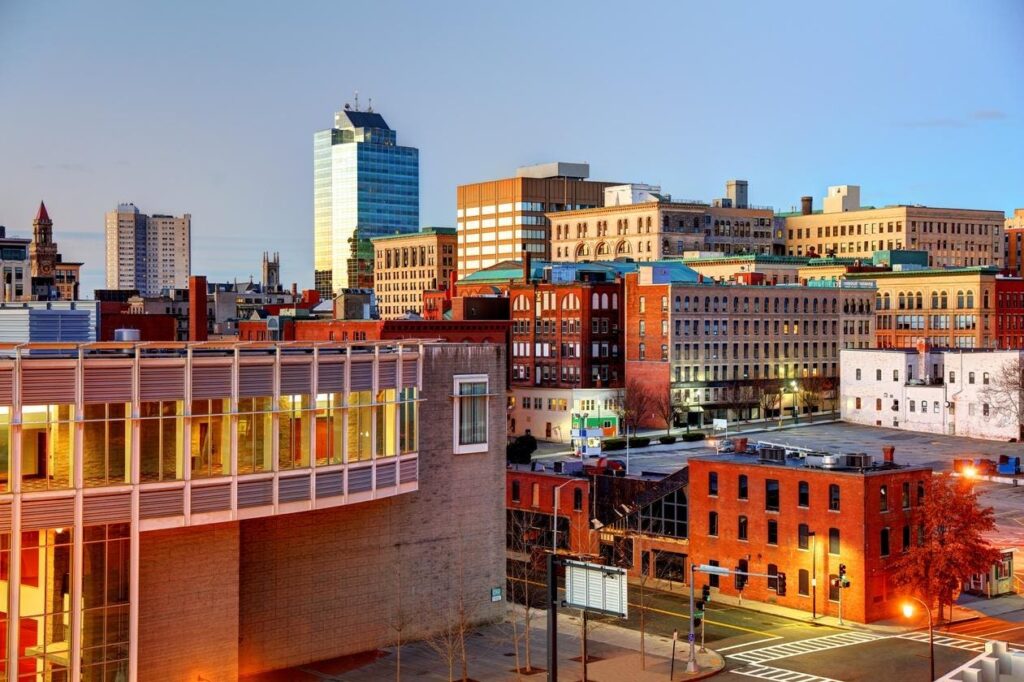Biz2Credit’s annual study of more than 60,000 companies across the U.S. found that the New England technology hub is accessible, educated, young, and relatively affordable.
Worcester, Massachusetts, is No. 1 among Best Small Business Cities in America in 2025, according to Biz2Credit’s annual review of the financial performance of small businesses across the country. The study examined 75,000 credit inquiries and applications from small to mid-sized companies made on Biz2Credit’s small business finance platform from all across the country for the full prior year (2024).
The study examined financial indicators, including annual revenue, credit score, age of business, and the proprietary BizAnalyzer® scores of businesses that applied for funding via the online site. The analysis found that small businesses’ average revenue increased while credit scores dipped slightly.
Related: How To Improve Your Credit Score and Secure A Business Loan
Worcester, Massachusetts
Located 45 miles west of Boston, Worcester had high average annual revenues, strong credit scores, and mature businesses. It is New England’s second largest and fastest growing city with a population that grew by 14% between 2010 and 2020. According to the 2020 Census, Wooster’s population (206,518) is at its highest point ever, and 51% of residents are under 35 years old.
The city benefits from having an educated workforce, thanks to the numerous colleges and universities in the area, including Wooster Polytech (WPI), one of the top schools in the country for mechanical engineering and computer science. The area is also home to UMass Chan Medical School, which trains the full range of medical disciplines, with an emphasis on practice in the primary care specialties, as well as College of the Holy Cross, which is ranked No. 28 out of 211 National Liberal Arts Colleges by U.S. News.
Graduates of these schools and others have helped to bolster Worcester’s economy, which is fueled by advanced manufacturing, robotics, biotechnology, biomanufacturing, computer sciences, and other high-tech sectors.
Further, over 2,700 new businesses were created in the past year in the county alone. Institutions of higher education supply talent and new ideas to the marketplace, according to the Worcester Chamber of Commerce. In fact, the professional, scientific and technical sector grew by a third, accounting for 3,498 new jobs in Worcester County between 2000 and 2010. The areas with the most growth are research and development and computer systems design, including video game design, which grew by 40% and 46%, respectively.
An influx of private and public investment has helped businesses old and new. In addition to having a thriving technology sector, Worcester has a diverse and lively bar and restaurant scene, featuring a wide array of international cuisines and lots of great local craft breweries.
Over the past 10 years, the city has seen $4.5 billion in major development projects, according to the Worcester Chamber, which been in the forefront of the city’s strategic effort to recruit new businesses, retain and develop a talented workforce, and foster entrepreneurial innovation in the region. The city benefits from offering a streamlined permitting process, a state-of-the-art fiber-optic infrastructure, and resources to assist with business development, site selection, and financing options.
Meanwhile, the cost of doing business (e.g., real estate, workforce, and the cost of living) in Worcester is less expensive than nearby larger metropolitan areas, but with many of the perks and conveniences afforded by larger cities. Accessibility is another advantage. Worcester just an hour’s drive from other major New England metro areas such as Boston, Providence, Manchester, and Hartford and is served by seven major highways. The city has daily commuter trains to downtown Boston, and is home to the Worcester Regional Airport with commercial flights on JetBlue, American Airlines, and Delta.
Other Top 5 Cities
According to Biz2Credit’s analysis, the other cities in the top five are: Ventura, CA, Greater Bridgeport-Stamford, CT, Portland, OR, and San Jose, CA.
California continues to have a stronghold on our rankings, with two of the top five coming from the Golden State. The economy of No. 2 Ventura, California, is diverse with specific strengths in agriculture, manufacturing, healthcare, retail, and hospitality. Small businesses in Ventura County (Ventura and Oxnard) had high average annual revenues ($1,075,489), strong average credit score (679), and are mature businesses.
The business environment in Ventura County offers a unique combination of infrastructure, skilled workforce, financial stability, market access, and the quality of life. The Ventura County Green Business Program is a free certification program that assists small- to medium-sized businesses by implementing sustainable and cost-saving measures.
This year’s top 5 continues to show the strength of our nation’s coastal states as hubs for small and medium size businesses.
The Greater Bridgeport-Stamford Area is an employment center with industry concentrations in manufacturing, healthcare, and retail/services. In fact, the region experienced a 5% net increase of jobs between 2010 and 2020 while the rest of Connecticut experienced little or no growth, according to the Connecticut Metropolitan Council of Governments (MetroCOG).
The cost of living in the Greater Bridgeport Area is nearly 15% lower than in Boston and nearly 30% lower than New York City. The organization also reports that nearly 50% of the local workforce has at least a bachelor’s degree and another 20% having some college training. The area’s labor pool can satisfy practically any employer’s requirements, from upper management, technical and office workers to skilled employees for the production line.
Greater Portland boasts the perfect mix of legacy industries and emerging technologies. Greater Portland is a destination for small businesses, as well as global brands. Portland’s prime West Coast enhances the ease of doing business there. With three ports and one of America’s best airports, export businesses, in particular, benefit from the Portland’s national and global connectivity.
Additionally, Greater Portland is home to a steady influx of young, skilled talent. With workforce development programs at local institutions and public-private partnerships at universities advancing key industries, the region’s talent is the driving force behind Portland’s economic development strategy.
San José fell from the top spot on Biz2Credit’s 2024 Best Small Business Cities list. Located in the Silicon Valley, the local economy is fueled by tech companies and the businesses that serve them. The city is home to about 66,000 businesses that employ a total of 439,000 workers in sectors ranging from advanced manufacturing to healthcare to software.
This city boasts an educated workforce; 50% of San José residents have a college degree or higher 1 in 3 San José residents have a bachelor’s degree or higher. The city’s downtown is Silicon Valley’s only urban live-work environment, home to 250+ restaurants and cafes, 40+ cultural venues, thousands of new high-rise homes. It also boasts numerous shopping destinations including Downtown and Santana Row.
Below is the full list of the Top 25 Cities for Small Business for this year (with 2024 ranking in parenthesis):
- Worcester, MA (unranked)
- Ventura/Oxnard, CA (13)
- Greater Bridgeport, CT (5)
- Portland, OR (7)
- San José, CA (1)
- Seattle, WA (4)
- Salt Lake City, UT (11)
- Colorado Springs, CO (3)
- Nashville, TN (22)
- Denver, CO (15)
- Buffalo, NY (unranked)
- Providence, RI (9)
- San Diego, CA (6)
- San Francisco, CA (2)
- Fresno, CA (unranked)
- Boston, MA (12)
- Richmond, VA (unranked)
- New York City, NY (8)
- Los Angeles, CA (17)
- Washington, D.C. (16)
- Baltimore, MD (10)
- Hartford, CT (23)
- Myrtle Beach, SC (unranked)
- New Haven, CT (unranked)
- Indianapolis, IN (unranked)
Other Key Findings Among Top Small Business Cities
- The most notable change was that California’s tech-heavy Bay Area dropped from last year’s top two spots (San José and San Francisco).
- The leading industries among the top cities are retail trade, construction, healthcare & social assistance, and accommodation and food services.
- Average credit scores decreased by 5 points, from 652 to 647.
Smaller cities fared well in the analysis; seven of them are new to the rankings this year: Worcester, MA (1), Buffalo, NY (11), Fresno, CA (15), Richmond, VA (17), Myrtle Beach, SC (23), New Haven, CT (24), and Indianapolis, IN (25).
Likewise, during a year when rising costs impacted many businesses, the largest metropolitan centers, which are usually among the most expensive places to live and work, lost ground. New York fell out of the 2024 top ten (No. 8) to No. 18 in the ranking this year. Los Angeles, the country’s second largest city, dropped two spots from 17 to 19. San Diego, the country’s eighth most populous city, fell from No. 6 to No. 13. Chicago, Houston, Phoenix, Philadelphia, San Antonio, Dallas, and Jacksonville, FL, did not make the list.
The 2025 Top Small Business Cities Study is based on actual verified cash flows of businesses on the Biz2Credit platform during 2024. Submitted cases with an annual revenue exceeding $5 million were excluded from the revenue analysis.
Read the full article here











